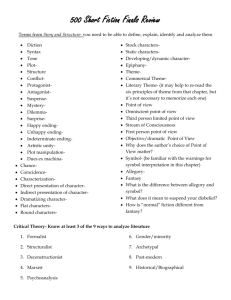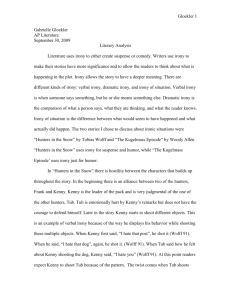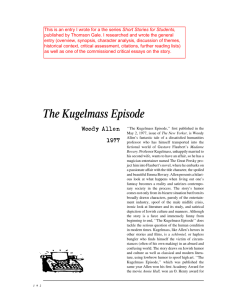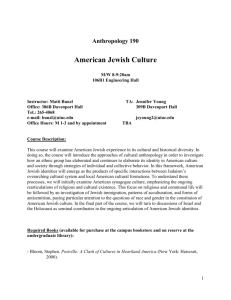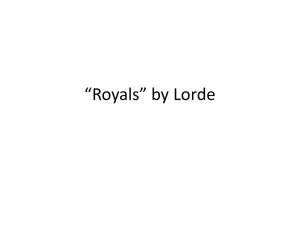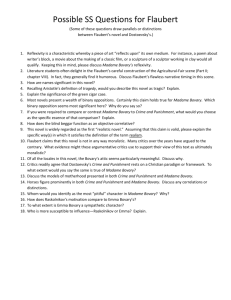Literary Analysis Essay
advertisement
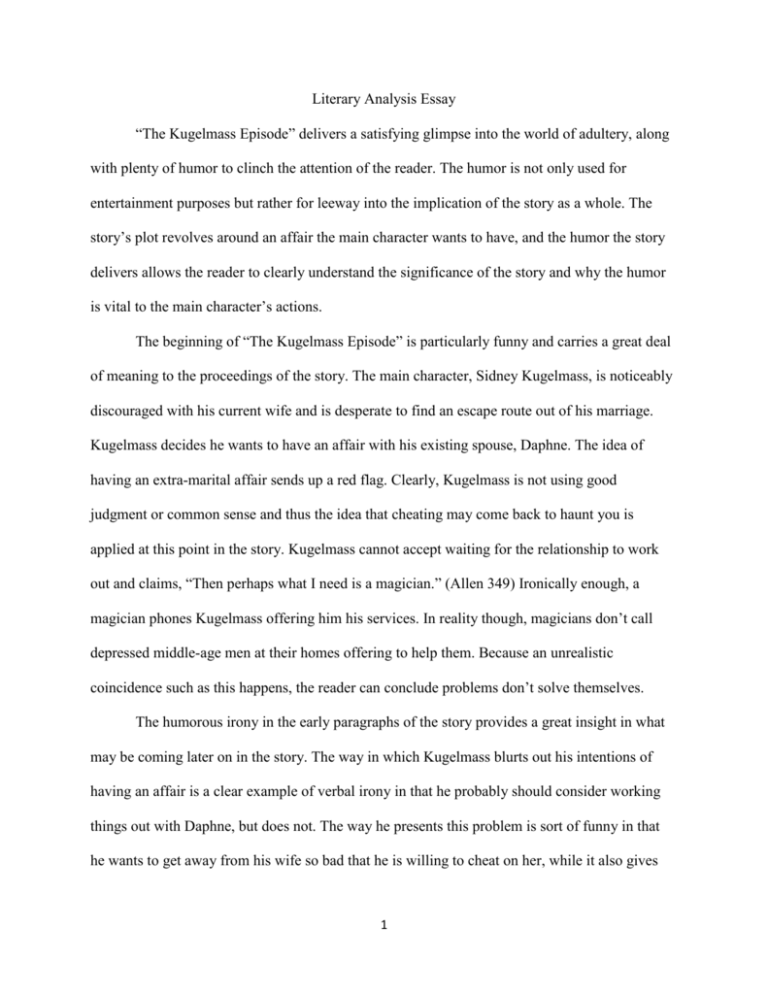
Literary Analysis Essay “The Kugelmass Episode” delivers a satisfying glimpse into the world of adultery, along with plenty of humor to clinch the attention of the reader. The humor is not only used for entertainment purposes but rather for leeway into the implication of the story as a whole. The story’s plot revolves around an affair the main character wants to have, and the humor the story delivers allows the reader to clearly understand the significance of the story and why the humor is vital to the main character’s actions. The beginning of “The Kugelmass Episode” is particularly funny and carries a great deal of meaning to the proceedings of the story. The main character, Sidney Kugelmass, is noticeably discouraged with his current wife and is desperate to find an escape route out of his marriage. Kugelmass decides he wants to have an affair with his existing spouse, Daphne. The idea of having an extra-marital affair sends up a red flag. Clearly, Kugelmass is not using good judgment or common sense and thus the idea that cheating may come back to haunt you is applied at this point in the story. Kugelmass cannot accept waiting for the relationship to work out and claims, “Then perhaps what I need is a magician.” (Allen 349) Ironically enough, a magician phones Kugelmass offering him his services. In reality though, magicians don’t call depressed middle-age men at their homes offering to help them. Because an unrealistic coincidence such as this happens, the reader can conclude problems don’t solve themselves. The humorous irony in the early paragraphs of the story provides a great insight in what may be coming later on in the story. The way in which Kugelmass blurts out his intentions of having an affair is a clear example of verbal irony in that he probably should consider working things out with Daphne, but does not. The way he presents this problem is sort of funny in that he wants to get away from his wife so bad that he is willing to cheat on her, while it also gives 1 the story a direction to follow. The use of irony in situation also comes into play when Kugelmass receives the phone call from the mysterious magician who just happens to call Kugelmass directly after he claimed he needed a magician to resolve his marriage. Both forms of humor/irony add to the plot and allow the reader to want to continue reading. Kugelmass comes to visit the magician in his run-down apartment. The Great Persky (the magician) answers the door and Kugelmass is blown away by what Persky tells him. Persky points to a cabinet and instructs Kugelmass he can send him to any novel he chooses by tapping on the cabinet with him and the novel inside. Once again, the idea that taking the easy way out may lead to a dead end is appropriate to apply here since Kugelmass is willing to perform such a foolish yet simplistic act to have an affair with his wife. Kugelmass is precise with his choice as he states, “What about Emma Bovary? That sounds to me perfect.” (Allen 349) With three quick taps on the cabinet, Kugelmass is released into the novel and appears in the bedroom of Emma and her husband, Charles. During this part of the story, Kugelmass pays Persky twenty dollars to go into a fantasy world of literature to meet an imaginary character. The irony of situation makes this scene so amusing in that Kugelmass actually has the nerve to pay a stranger twenty dollars to stand inside a cabinet because he is so desperate to have an affair. Kugelmass consciously believes at this point in time that standing in this barren cabinet is his golden ticket to meeting another woman. Ironically enough, the magician is true to his word, the trick works to perfection and Kugelmass is cast into Madame Bovary. The two newly acquainted lovebirds are matched within the story. Emma confesses she is wishing to leave her spouse also. At this point in the story, both main characters want to have affairs and signs point to trouble from here on out. Not only is Kugelmass being deceiving and 2 sneaky toward his wife, he is also creating a dilemma in the book Madame Bovary. Kugelmass’s lack of intelligence and desire for love cause the French-based novel to alter. “I cannot get my mind around this,” a Stanford professor said. “First a strange character named Kugelmass, and now she’s gone from the book.” (Allen 354) Kugelmass did not account for the consequences he might face before leaping into the book with Emma and the thought of always using your best judgment obviously did not factor into Kugelmass’s decision. Dating back to the humor from the beginning of the story, Kugelmass’s decision to have an affair is now affecting the actual novel of Madame Bovary. Kugelmass can now affect the events of the story and can alter the way the story is told, not to mention others reading Madame Bovary are picking up on this quite easily. Kugelmass now realizes he must get Emma back into her time and back into the story. The two venture over to Persky’s flat and Emma is placed inside the magic cabinet. Persky raps his fingers three times across the cabinet, but nothing happens, and Emma remains inside the cabinet. Persky claims it is just a minor technical problem and dismisses the couple, telling them to return in a few days. Kugelmass might at this point realize his decisions are hurting him rather than benefiting him. The concept of what goes around comes back around seems fitting for Kugelmass. He wanted to find love but approached it the wrong way by intentionally having an affair with his wife. Emma and Kugelmass’s feelings begin to dwindle and the two reach a point where Emma locks herself in a bathroom refusing to comply with her secret lover. Now, Kugelmass has managed to kill two birds with one stone, committing adultery and losing a fictional lover from a novel. He has seemingly made himself even more miserable by having the affair. 3 Kugelmass brought all of this drama upon himself, which in itself, is humorous. The affair has seemingly failed him because now even an imaginary character from a 19th-century novel does not want to be with him. The other funny bit to this part of the story comes when Kugelmass is worried that his wife will discover his traces in the book Madame Bovary since he visited Emma a number of times. Kugelmass was purposely trying to end his marriage by having an affair and now it seems he is worried his wife will be upset over his affair, which is what he wanted to begin with. Persky also claims he is not a therapist which is verbally ironic because Dr. Mandel had said in the beginning that he wasn’t a magician. Kugelmass is now faced with a relationship problem and only has the magician to lean on whereas before he relied on the therapist to perform magic. The story ends abruptly following Kugelmass returning to Persky’s apartment to be warped into a different novel, this after promising he would never cheat on Daphne again. Kugelmass plies into the magic cabinet with Portnoy’s Complaint. Persky rapped the cabinet three times. Instead of the typically popping noise the cabinet made when Kugelmass went to the novel of his choice, a small explosion occurred, along with a series of loud sounds and sparks. Dumbfounded by the sudden blast, Persky fell over and dropped dead, while the entire apartment burst into a fiery inferno and burned to the ground. In the end, Kugelmass ends up with no wife, no girlfriend, and trapped inside a remedial Spanish book. His intentions of having an affair made his life much more miserable than before and proved his decision-making was fatal to his love life and life in general. It was funny though wasn’t it? Kugelmass became obsessive with going to Persky in search of romance and love and all he got in return was a pie in the face. He wanted a new relationship and did not want the burden of a nagging wife anymore when in the end, he ended up with the exact same thing he wanted to 4 get rid of. Kugelmass was not supposed to come back to Persky because he claimed he was done cheating on Daphne, and the funny part is the final time he visits Persky the entire apartment burns down. Kugelmass is not thrust into Portnoy’s Complaint, but rather a Spanish book where the word “tener” meaning, “to have” is chasing him all over the place. Kugelmass wanted to have an affair with Daphne and he did, so now he is paying the consequences; he is projected into a world with no romance, love, music, or French beauties but rather an oblivion with the word “tener” floating about aimlessly. 5 Works Cited Page Arp, Thomas R., and Greg Johnson. Perrine's Literature: Structure, Sound, and Sense. Ninth ed. Boston, MA: Thomson Wadsworth, 2006. Print. 6
